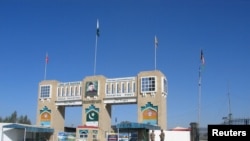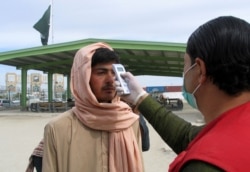Pakistan has temporarily closed a key southwestern crossing point with Afghanistan, saying the move is meant to prevent the spread of coronavirus on both sides of the border.
An official announcement Monday said the Chaman crossing in Baluchistan province was being shut for "an initial period of seven days... in the best interest of the people of brotherly countries.”
Meanwhile, authorities in the southern province of Sindh extended the closure of all educational institutions for two weeks following the confirmation of a second case of the virus in Karachi, the provincial capital and the country’s largest city. Schools in Sindh have been closed since Thursday.
Pakistan has confirmed a total of four cases, including two in the national capital, Islamabad. The ministry of public health in Afghanistan says one person has tested positive and that authorities are investigating 17 suspected cases. Those individuals are being kept in isolation wards.
Both countries have linked the confirmed and suspected cases of what is officially known as COVID-19 to an outbreak in neighboring Iran, where the virus has killed 66 people among more than 1,500 confirmed infections there.
Pakistani authorities suspended all flights to Iran and closed the land border last week. Pakistan has also halted air links and delayed opening of the only land crossing with China, the epicenter of the outbreak. In December, Chinese officials detected the disease, which has since killed more than 2,900 people. The number of infections in the country has surpassed 80,000.
The Afghan government has closed all schools and banned public gatherings until further notice in the western province of Herat, next to the Iranian border. The province is where the first suspected cases were detected late last month among Afghans who had recently returned from Iran.
Afghan authorities have tightened screenings at border entry points and limited land and air links with Iran.
Afghanistan's health minister, Feruzuddin Feruz, urged Iranian authorities Monday to stop the “mass deportation” of Afghan immigrants, fearing it could lead to an increase in the number of infections in Afghanistan. He told reporters in Kabul that Tehran sends back up to 3,000 Afghans daily and that drug addicts are also among the fresh deportees.
The central Asian states of Uzbekistan and Turkmenistan have also closed their borders with Afghanistan. Afghan officials told VOA the abrupt closure Sunday has stranded hundreds of truck convoys in the northern Hairatan border region.
Experts worry Iran’s percentage of deaths to infections, around 5.5%, is much higher than other countries, suggesting the number of infections in Iran may be much higher than current figures show.
Although the cases in Iran are “low and limited” compared to global statistics, Tehran is “rapidly and accurately” responding to the crisis stemming from the outbreak, said a statement issued by the Iranian embassy in Pakistan last week.
On Monday, an Iranian government spokesman, Ali Rabiei, addressing journalists by teleconference, acknowledged the challenges remaining for his country and said, "We will have two difficult weeks ahead.”






